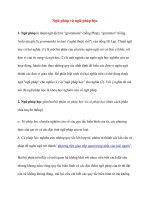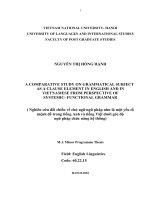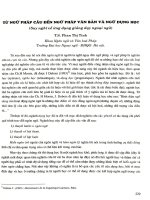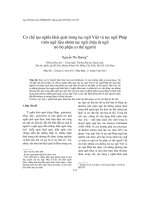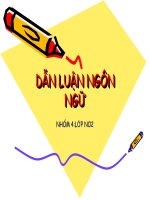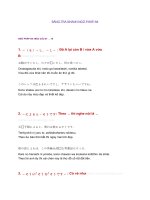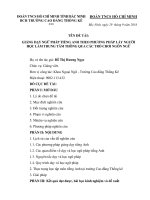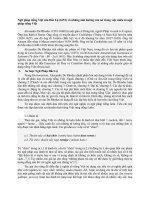Ngữ pháp và bài tập thực hành tiếng anh 7 global success
Bạn đang xem bản rút gọn của tài liệu. Xem và tải ngay bản đầy đủ của tài liệu tại đây (5.3 MB, 115 trang )
Nguyễn Hoàng Thanh Ly - Minh Luận
NGỮ PHÁP VÀ BÀI TẬP THỰC HÀNH
TIẾNG ANH 7
MỤC LỤC
UNIT1
:HOBBIES
UNIT2_
:HEALTHY LIVING.
UNIT 3
:COMMUNITY SERVICE
PRACTISE TEST 1 (UNITS 1,2,3).
UNIT4_
:MUSIC AND ARTS.
UNITS
:FOOD AND DRINK
UNIT6
:A VISIT TO ASCHOOL.
PRACTISE TEST 2 (UNITS 4,5,6).
UNIT7
:TRAFFIC.
UNIT8
:FILMS.
UNIT9
:FESTIVALS AROUND THE WORLD.
PRACTISE TEST 3(UNITS 7,8,9).
UNIT 10
:ENERGY SOURCES
UNIT 11
: TRAVELLING IN THE FUTURE
UNIT12
:ENGLISH-SPEAKING COUNTRIES.
PRACTISE TEST 4 (UNITS 10, 11, 12).
KEY- DAP AN....
UNIT 1 : HOBBIES
(SỞ THÍCH)
.A. NGỮ PHÁP (GRAMMAR)
1. Thì hiện tại đơn (Present simple tense)
1. Công thức với động từ be
a. Thể khẳng định (Positive form)
ram
He/She/it+ is
'We/You/They+ are)
Ví Dụ:
!am short. (Tơi thì thấp.)
She is tall. (C6 ấy thì cao.)
They are workers. (Ho [8 cng nhân.)
b. Thế phủ định (Negat fe form)
Team not
He/She/It + is not(isn't)
'We/You/They + are not (aren't)
VÍ DỤ:
He isn't a waiter. (Anh dy không phải là phục vu.)
ThE gt én (Question form)
Am+1...?
Is + She /He /It. .?
Are + we /you /they ..?
Trả lời
Yes,|+am/No,|+am not.
Yes,he/she/it+is/ No,he/she/it + isn't.
Yeswe/you/they+are/ No,we/you/they+aren't.
vi DU:
Isshe
a teacher? Yes,she is,/No,she isn't.
(Cô đy là giáo viên phải không?) (Vang, dúng vậy.)/ (Không, không phải.)
2. Công thức với động từ thường
a. Thể khẳng định (Positive form)
/We/You/They + V [nguyên thể)
He/She/It e/She/It+V_s/es
ViDụ
1 practise Judo. (Tôi tập Judo.}
She plays badminton every afternoon. (Cô ãychơi cấu lông mỗi chiếu.)
@ Luu ý: Quy tắc thêm s/es
~ Thêm es vào những động từ tận cùng là các chữ ch, sh, o,s;x,z: wash -> washes, do -> does, fax >
faxes, buzz->buzzes
~ Thêm s vào những động từ còn lại: live - lives, speak -> speaks, tell->tells
~ Động từ tận cùng bằng chữy có hai trường hợp:
Nếu trước y là một nguyên âm (u, e, o, a, i) thì ta thêm s bình thường: stay->stays
Nếu trước y là một phụ âm, đối y -> ¡ rồi thêm es:
fiy->files
~ Các động từ không theo quy tắc:
have->has
b. Thế phủ định (Negative form)
I/We/You/They + do not + V (nguyên thể]
He/She/It e/She/It+ does not + V (nguyên thé)
Ví Dụ:
| don't like sweets. (Tơi khơng thích kẹo ngọt.)
She doesn't have any pencil (Cơ ấy khơng có cây bút chì nào.)
Do +I/We/You/They + V [nguyên thé)?
Does + He/She/It e/She/It + V (nguyên thé) ?
Trả lời
Yes,i/we/you/they+do.
Yes,he/she/it + does.
No,1/we/you/they + don't.
No, he/she/it + doesn't.
ViDụ
Do you play sports?
(Bạn có chơi thế thao khơng?)
Does she like oranges?
(Cơ ấy thích cam khơng?)
Yes,1 do./No,| don't.
(Vâng,có.)/(Khơng, khơng có.)
Yes,she does. / No,she doesn't.
(Vâng, cơ ấy thích.) / (Khơng, cơ ấy khơng thích.)
3.Cách dùng
- Diễn tả thói quen hằng ngày.
ViDụ
1 usually get up at 6.00 a.m. (Tôi thường thức dậy vào lúc 6 giờ sáng.)
~ Nói về sự thật hiển nhiên.
ViDụ
The sun rises in the East. (Mặt trời mọc ở phía đơng.)
~ Nói về sự việc xảy ra theo lịch trình.
ViDụ
The first bus leaves at 5.00 a.m tomorrow.
(Chuyến xe buýt đấu tiên rời bến lúc 5 giờ sáng mai.)
- Diễn tả một suy nghĩ, cảm giác hay cảm xúc.
ViDụ
I think your dress is very beautiful.
(Tôi nghĩ là cái váy của ban rất đẹp.)
I trust you. (Tôi tin ban.)
~ Dùng trong các mệnh đề trạng ngữ chỉ thời gian
ViDụ:
| will go to bed after |finish my homework.
(Tôi sẽ di ngủ sau khi tôi làm xong bài tập.)
~ Dùng trong mệnh đề if của câu điểu kiện loạiI
ViDụ:
If | don't work hard, | won't have enough money for daily expenses.
(Nếu tôi không làm việc chăm chỉ, tơi sẽ khơng đủ tiền cho các chi phí hàng ngày.)
.4. Dấu hiệu nhận biết
Trong câu thì hiện tại đơn thường có các từ:
always (ln ln), usually (thường xun), often (thường xuyên), frequently (thường xuyên),
sometimes (thỉnh thoảng), seldom (ít khi), rarely (hiếm khi), never (không bao gid)
ViDụ:
We often have lunch at 12 o'clock.
(Chúng tôi thường ăn trưa lúc 12 giờ.)
every day/uweek/month/year... (mỗi ngày/tuần/tháng/năm..
ViDụ:
| go to bed early every day. (Tôi đi ngủ sớm mỗi ngày.)
'once/twice/three times/four times... (một/hai/ba/bôn...lân)a day/week/month/ year... (một
ngày/tuẩn/tháng/năm)
ViDụ:
He goes to football club twice a week.
(Anh ấy đến câu lạc bộ bóng đá hai lần một tuần.)
in the afternoon (vào buổi chiếu), in winter... (vao mùa đông)...
ViDụ:
It's cold in winter. (Trời lạnh vào mùa đông.)
.on Mondays/Tuesdays... (vào ngày thứ Hai/thứ Ba)
ViDụ
They have literature on Tuesdays.
(Họ học môn văn vào các ngày thứ Ba.)
at weekends (vào các ngày cuối tuần)
ViDụ:
He goes on a picnic at weekends.
(Anh ấy đi dã ngoại vào các ngày cuối tuần.)
II. Động từ chỉ sự yêu thích (Verbs of liking)
'Động từ chỉ sự yêu thích thường chỉ sở thích hoặc thói quen chung chung. Chúng có thể bao gồm cả
những động từ chỉ sự ghét. Phổ biến là: love, like, fancy, adore, enjoy, dislike, hate, detest. Cả hai loại
này đều có chung cơng thức và cách sử dụng.
1. Công thức chung,
S+Verb of | ing + Ving
ViDụ:
Like doing morningexercise every day.
(Tơi thích tập thé dục buổi sáng mỗi ngày.)
@tưu
~ Ở những tình huống cụ thể thì những động
từ chỉ sự yêu thích trên được theo sau bởi động từ có dạng,
nguyên thể có “to” (to infinitive):
S+Verb of liking + to infinitive
ví DỤ
‘We don't like to travel by bus today.
(Hơm naychúng tơi khơng thích đi bằng xe bt.)
~ Động từ theo sau enjoyluôn & dang V_ing.
2. Thể phủ định và nghỉ vấn
~ Thể phủ định và nghỉ vấn được sử dụng như với động từ thường ở thì hiện tại don.
ViDụ:
Huong doesn't like hanging out in class.
(Hương khơng thích tán gẫu trong lớp học.)
Does he like driving?
(Anh ấy thích xe khơng?
Yes, he does.
(Vâng, anh ấy thích.)
~ Thể phủ định của các động từ với nghĩa “thích” thì có nghĩa là “khơng thích” chứ không hẳn là “ghét”
ViDụ:
‘We don't like getting up early.
(Chúng tôi khơng thích thức dây sớm.)
B. BÀI TẬP (EXERCISES)
1. Hồn thành câu với dạng hiện tại đơn của các động từ trong ngoặc. (Complete the sentences with
the present simple from of the verbs in brackets.)
she,
(be) a student.
2You
(be) very tall.
3.He
(live) in Da Nang.
4loften
(cycle) to school
5.My mom.
(be) at home now.
6.She
(work) in District 3.
7.0ur exam
(start) at 7 am.
&.They
(be) on the way to school.
9.We
(study) hard to get good marks.
10.1 sometimes
(get up) late in the morning.
II. Chuyển các câu sau sang thế phủ dinh. (Change the sentences into negative form.)
1.1 do my homework.
2. Henry rides his bicycle.
3. The boys run in the yard.
4. It rains a lot in the south.
5. You are very punctual
6. My mother is a bank clerk.
7. His father drives a new bike,
8. Her sister buys a loaf of bread.
9. They are teachers in our school.
10.We usually watch TV in the evening,
IL. Chuyển các câu sau sang thể nghỉ vấn. (Change the sentences into question form.)
1. The weather is good today.
2. Ms. Hoa works in the office.
3. Mr.Dawson is from Singapore.
4. Kim and Anna live near here.
5. They are hard-working and smart.
6. Xuan plays badminton very well.
7. His hobbies are judo and swimming,
8. You live very close to the school.
9. Vicky and Kenny are close friends.
10. Ms. Ann and Ms.lodie usually go to the gym.
IV. Chọn phương án diing. (Choose the correct option.)
1. He (am/is) a truly good student.
2. We (not live/don't live) in a big city.
3. Sylvia (doesn't like/don't like) her new school.
4, She (aren't/isn't) in the classroom now.
5. Our lesson (finishes/finish) at half past four.
6. We (is/are) very busy right now.
7. You (don't often do/often does) the housework.
8. William never (lie/lies) to his friends.
‘9, Which class (you are/are you) in this year?
10. Martin (doesn't go/don't go) to school on Sunday.
V. Chon cau trả lời đúng A, B, C, hoặc D. (Choose the correct answer A, B, C,or D.)
He
a lot of books.
Aread
B.is read
Creads
D. is reads
2. She
Adrinks never
3.My mother
Abe
4, Our teacher
A. don't walk
C.doesn't walks
5. She
lemonade in the morning.
Cdrink never
B.never drinks
a teacher
in this school.
Bam
Care
to school every day.
B.don't walks
D.doesn't walk
television at dinner time.
D.never drink
Dis
A. often doesn't watch
C. doesn't often watch
6.He
Ahas
B.have
Tt
Aisnt
Baren't
8. My sister.
A. get up rarely
Grarely gets up
B. don't often watch
D. don't watch often
an English lesson every Thursday.
Cis has
Dis have
very far from his home to the school.
Care
Dam
early
at the weekend.
B.rarely get up
Dgets up rarely
9.They
right before bedtime.
Aeats usually
B. are usually eat
C.do usually eat
D. don't usually eat
10.The sun
in the east and
in the west.
A.rise-set
B.rises-set
Crises sets
D.rise-sets
VI. Hoàn thành các câu, sử dụng dạng -ing của động từ trong ngoặc. (Complete the sentences,
the -ing form of the verbs in brackets.)
1. Tom likes
cars very much. (collect)
2. He detests
photos.(take)
3. They don't like
dollhouses. (build)
4.My friend Linda enjoys
with Jack.(dace)
5. Mai dislikes
judo.(do)
6. Nam adores,
models.(make)
7. She hates
football. (watch)
8. The boy doesn't like
a horse.(ride)
9. My father loves
around the world, (travel)
10. Does your sister enjoy.
?(cook)
VII. Chọn phương án đúng. (Choose the correct option.)
°
ˆ
. Llike (eat/ eating) Pizza on Saturdays.
. My sister (doesn't likes/ dislikes) tidying her room,
. She enjoys (making/ makes) dinner on Sundays.
. Arthur loves (plays/playing) rugby with his friends.
. My aunt (dislikes driving/ dislikes drive) at night.
. Our brothers (adore sleeping/ adore to sleeping) in the tent.
. Those children (love/loves) listening to the radio.
8. These men hate (working / work) on Sundays.
|. My niece (fancies reading / fancy read) adventure books.
10. Your father’s friends (detest/ detests) driving their cars when it is raining.
VI Sắp xếp các từ thành câu có nghia. (Reorder the words to make a meaningful sentence.)
1. my mother / music/ listening to/ doesn't like
2. dislikes/Hung/washing/his bike
3. travelling/my parents/love/by plane
4, emails/writing/I/adore/to/my
friends
S.watching/detests/horror films/Anna
UNIT 2 : HEALTHY LIVING
(SONG LANH MANH)
‘A. NGU PHAP (GRAMMAR)
Câu don (Simple sentences)
Câu đơn hay còn gọi là câu độc lập thường bao gồm một chủ ngữ và một động từ. Câu đơn thể hiện đấy.
đủý muốn truyên đạt.
VÍ DỤ:
I study English in the morning,
(Tôi học tiếng Anh vào buổi sáng.)
~ Một số câu đơn có một chủ ngữ và một động từ.
VÍ
DỤ:
1 wrte. (Tơi việt.)
~ Một số câu đơn có thêm tân ngữ.
VÍ DỤ:
1 writea letter. (Tơi viết một lá thu.)
~ Một số câu đơn có thêm trạng ngữ.
VÍ DỤ:
Iwrite a letter every day. (Tôi viết thư mỗi ngày.)
B. BAI TAP (EXERCISES)
1. Viết Y (yes) vào cuối câu nếu nó là câu đơn, nếu khơng phải thì viết N (no). (Write Y at the end of the
sentence if tis a simple sentence, if not, write N.)
VÍ
DỤ:
NSPRYNE
‘We aren't at home now.
They don't study hard and they often get bad marks.
I'm cold.
. She isn't
so careful.
. I'm not sure that she will come.
. I'm surprised that she isn't here.
. We're going to a match on Sunday.
. Can you raise your hand so | can see?
. She gives piano lessons to the students.
Y
N
8. He gets 2 lot of letters from pen friends.
9. They walked because they couldn't afford a taxi.
10. It's healthy to eat when we're hungry and to stop when we're full.
II. Các từ và cụm từ được gạch dưới trong các câu sau là tân ngữ (O) hay trang tir (Adv)? (Are the
underlize words and phrases in the follwing sentences objects (0) or adverbs (Adv)?)
Ví DỤ:
caught a cold.
She is usually late.
They don't often surf the Internet.
°
Adv
AdvO
PRN PVAYNE
|. Iread a book.
. We seldom go out.
. Did they take you home?
. Please bring me the book.
. I caught a terrific headache.
. It was really hot last night.
. He never makes big decisions.
. Have you already read the letter?
). She ever cooks this kind of food.
10. He doesn't normally arrive until seven.
IL. Viét lại các câu sau thành câu đơn. (Rewr
viol
He makes a kite. He makes a paper bird.
> He makes a kite and a paper bird.
1 You look pale. You look tired.
2. It's dark. It's very cold outside.
3. We have fruits. We have vegetables.
the sentences into simple sentence.)
.4. She is healthy. She is full of energy.
5. He is very tall. He is handsome.
6. They need a table. They need some chairs.
7. The street is narrow. The street is crowded,
8. I'm not good at math. I'm not good at English.
9. He doesn't play cards. Hie doesn't play Chinese chess.
10. They talk about fresh air. They talk about
good food.
IV. Viết câu đơn với các từ g
. (Write simple sentences from the prompts.)
1. Water/freeze/at 0°C.
2. Ms. Emelia/ enjoy/ cooking.
3. the girls /like/ice cream?
4, They/not/listen/me.
5. she/drink/ milk/after meals?
6. My brother's dog/bark/a lot/night.
7.They/only/speak/English/work.
'8..Mr.Hoang/not/teach/chemistry
9. The bus/ leave /in fifteen minutes.
10. Toronto and Montreal/ be / Canada.
v. Sép xếp các từ thành câu don. (Reorder the words to make a simple sentence.)
1. take/the/Henry and william /bus
2.The / doesn'/ take off /11 a.m./flight/at
. brushes/Anna/teeth/twice/her/a day
ˆ
. works/My brother/never/on/weekends/the
- at/leaves/The/every morning /7 a.m./train
s. go/the/often/I/to/library
. the/I/ wait for/bus station/Mai and Susan/at
2
. does/train/ from Osaka/When /the/ to Tokyo/ leave?
9. Jane and her sister/this/attend/school/anymore/don't
10. loves/ to play/ basketball/on/He/weekends/with /friends/his
VI. Các câu sau đây đã hoàn chỉnh chưa? Viết C nếu câu hồn chỉnh hoặc / nếu khơng. (Are the
following sentences complete? Write C (Complete) if the sentence is complete or | (Incomplete) if
not.)
emuannkw
1.1 love my mother.
. He studies English very well.
3. Often drinks wine.
. Jogs every day.
. She lots of vegetables.
. They do yoga in the room.
He a bike in the park.
. We are having dinner.
). His clothes are on the sofa.
10.1 meet.
VIL. Nối hai phần của câu thành một câu đơn. (Match the two parts into a simple sentence.)
1.He likes playing
A.from Tokyo.
2.Mai met
B. him yesterday.
3.They are
C like swimming,
4. This is my
D football every afternoon.
S.How old
Efriend Lan.
Fis he?
6.1don't
VI. Tìm và sửa một lỗi sai trong mỗi câu sau đây. (Find and correct one mistake in each following
sentence.)
1. There are a book on the desk.
2. Hoa do the dishes every day.
3, She doesn't likes making models.
4, The children hate to jog.
5. They enjoy to build dollhouses.
6. He run very fast.
UNIT 3 : COMMUNITY
SERVICE
(DỊCH VỤ CỘNG ĐỒNG).
A. NGU PHAP (GRAMMAR)
Thi qué khi don (Past simple)
1. Công thức với động
từ be
a. Thể khẳng định (Positive form)
I/He/She/It + was
We/You/They + were
vi DU:
He was only a kid seven years ago.
(Câu ấychỉ là một đứa bé bảy năm trước.)
b. Thế phủ định (Negative form)
I/He/She/It+was not
We/You/They +were not
was not = wasn’t
were not = weren't
vi DU:
I wasn't at her house yesterday.
(Hơm qua tơi khơng có ở nhà cô ây.)
c. Thể nghĩ vấn (Question form)
Was#l/he/she/it?
'Were+we/you/they?
Trả lời
'Yes,J/he/she/it+ was.
Yes,we/you/they+ were.
vioy:
No, I/he/she/it + wasn't.
No,we/you/they +weren't.
'Was the lake full of rubbish yesterday?
(Hôm qua cái hổ đẩy rác phải không?)
Yes,it was. / No, it wasn't.
(Vâng, đúng rồi. / Không, không phải.)
2. Công thức với động từ thường
a. Thể khẳng dinh (Positive form)
~S= Subject: we, you,they, he,she,it
SeV-ed/V2
VÍ DỤ:
They cleaned the beach a week ago.
(Họ làm sạch bãi biển cách đây một tuần.)
b. Thế phủ định (Negative form)
S+did not +V
vi DU:
She didn't join any volunteer program last summer.
(Cô ấy khơng tham gia chương trình tình ngun nào mùa hè trước.)
c. Thể nghĩ vấn (Question form)
Did
+ S +V ( nguyên
thể ) ?
Trả lời:
Yes,S+did.
No,S+didi
vi DU:
Did they start that project last year? Ho bắt đầu dự án đó năm ngối phải không?
Yes, they did. / No, they didn't.
(Vâng, dúng vay.
/ Không, không phải.)
3.Cách dùng
- Diễn tả một hành động diễn ra tại một thời điểm cụ thể hoặc một khoảng thời gian trong quá khứ và.
đã kết thúc hoàn toàn ở hiện tại
vi DU:
khoa participated in a volunteer project from 2014 to 2015.
(Khoa tham gia vào một dự án tình nguyện từ năm 2014 đến năm 2015.)
- Diễn tả một hành động lặp đi lặp lại trong quá khứ và hiện tại khơng cịn nữa.
vi DU:
‘When Minh was young, he often got up late.
(Khi Minh còn tré, cậu ấy thường thức dậy trể.)
- Diễn tả các hành động xảy ra liên tiếp trong quá khứ.
vi DU:
Yesterday, | came home, had dinner, and watched T.V.
(Hôm qua tôi về nhà, ăn tối và xem ti vi.)
- Diễn tả một hành động xen vào một hành động khác đang xảy ra trong quá khú.
vi DU:
‘When I was waiting for the green light this morning, a foreigner asked me for direction.
(Khi tôi đang chờ đèn xanh sáng nay thì một người nước ngồi nhờ tơi chỉ dường.)
~ Dùng trong câu điểu kiện loại I.
vi DU:
If joined your program, | would help many people.
(Nếu tôi tham gia chương trình của bạn thì tơi đã giúp rất nhiểu người.)
.4. Động từ ở thì quá khứ đơn
a. Quy tắc thêm -ed
Thông thường ta thêm ed vào sau động từ
vi DU:
clean > cleaned, work-> worked, paint -> painted
Tan cùng của động từ là e thì chỉ cần thêm d.
vi DU:
provide > provided, raise > raised,decide-> decided
- Tân cùng của động từ là .
Nếu trước y là một nguyên âm (a, e, i, 0, u) thì thêm ed bình thường.
vi DU:
play->played,stay->stayed,enjoy->enjoyed
Nếu trước y là phụ âm thì đổi y thành ¡rồi thêm ed.
vi DU:
try > tried, fly > flied, classify > classified
~ Động từ có một âm tiết, tận cùng là một phụ âm, trước phụ âm là một ngun âm thì nhân đơi phụ âm
cuối rồi thêm ed.
vi DU:
ban > banned, grab->grabbed.
b. Động từ bất quy tắc
Có một số động từ khi sử dụng ở thì quá khứ đơn không theo quy tắc thêm Cẩn học thuộc bằng động tir
bất quy tắc.
vi DU:
become
drink
give
know
meet
see
write
->
>
>
>
>
>
>
became trởthành trởnên
drank uống
gave
cho
knew_ biết
met
gấp
saw
thấy
- wrote - việt
vi DU:
started, recommended,neededvisited, wanted
~ ed được phát âm là /id/khi tận cùng của động từ là t, d
c. Cách phát âm ed
~ ed được phát âm là /tl khi tận cùng của động từ là ch, s, x, sh, k, ,p
vi DU:
:looked helped, washed
~ ed được phát âm là /d/ khi tận cùng của động từ là các phụ âm và ngur âm cịn lại.
VÍ DỤ:
loved, called,trained
Trong câu sử dụng thì quá khứ đơn thường có các trạng từ chỉ thời gian trong quá khứ:
-yesterday (hôm qua)
- last night/last week/last month/last year (tdi qua/tuần truớc/tháng trước/ năm ngoái)
~ ago (cách day): two hours ago (cách đây hai giờ), two weeks ago (cách day hai ngày)
- in the past (trong quá khứ)
~in 2001 (trong năm 2001)
B. BÀI TẬP (EXERCISES)
1. Chia động từ trong ngoặc theo thi quá khứ đơn. (Supply the correct form of the verb in brackets in
the past simple.)
ul
(sleep) well last night.
2.He
(have) a dog last year.
Bult
(rain) heavily this morning.
4She
{eat) dinner an hour ago.
5. We,
{go) to school yesterday.
6.He
(change)
the school in 2020.
7.lim
(miss) the class last Monday.
8.He
(start) work here last November.
9.Mr.Fred
(study) medicine in college.
10.They
(begin) their work on the project in May.
II. Chuyển các câu sau sang dạng phủ định. (Change the following sentences into negative form.)
1. I met the dentist a week ago.
2. Her sister left the school in 2021.
3. The rain stopped fifteen minutes ago.
4, We watched a movie last Sunday.
5. He studied English two years ago.
6. We played basketball last Saturday.
7. The last bus left a few minutes ago.
8. Our teacher was at his house some hours ago.
9. They bought a new apartment last month.
10. My brother and | went to bed early last night.
IIL. Chuyển các câu sau sang dạng câu hỏi.
1. They ran straight across the road.
(Change the following sentences into question form.)
2. Your friend sat alone in the dark.
3. She was alone at home last night.
ˆ
. She finished her work at five o'clock.
5. You received the package yesterday.
6. His hobbies were skiing and scuba diving.
7. You went to the central post office last Sunday.
8. The Johnsons travelled to Singapore two years ago.
9. Mr.Henderson ate a small lunch before the meeting.
10.The music distracted the students from their studies.
IV. Viết câu hoàn chỉnh sử dung qué khit don. (Write full sentences using the past simple.)
1. George/ come / home/ very late / last night.
2. I/watch/ very funny video / Youtube.
3.Where/be/you /7 o'clock/last Friday?
4, She/come into/ room / and shut/ door.
5. We/go / for a walk / to enjoy/ landscape.
6. Ms. Rebecca/have/ meeting/ with/ her colleagues.
7. He/visit/ relatives/ their summer house/ river.
8. John and his friends / enter/hall/to attend/party.
9. They/buy/three tickets/for/ Red Velvet concert.
10. He /enter /a room,/ lit /a cigarette, / and / smile /at / guests.
`V. Sắp xếp lại thứ tự các từ đế tạo thành câu có nghĩa. (Reorder the words make meaningful
sentences.)
11. My sister/ a/drank/ an/ glass of milk/hour/ ago
2. marked/The teacher/ answer books of students/the
3. ate/yesterday evening /I/ beef noodle soup/my best friend/with
4. didn't/I/the wood/into the water/but/it/sink/threw
5. He/was/well/last night/ didn't sleep/because/sick/he
6. in /about 3 kilometers/the/park/yesterday/ran/Mr.Brian
7. swimming/went/They/in/last Saturday morning/ the sea
8. The company/ didn't/ last year / my father's salary/increase
°
. a lot of shopping / at/ ago/ did/the shopping mall /We / some days
10. a glorious time / in / My cousin/the south of France/had/last summe
VI. Chọn phương án đúng. (Choose the correct option.)
1. They(was/were) asbent at her party yesterday.
2. He (does/did) judo two years ago.
3. She (answered/answerred) the question exactly.
4. It's better to keep silent about what (happenned/happened).
5. My father (worked/works) for the company last year.
6. Jolie(singed/sang) very well.
7.l(get up/got up) late this morning.
8. My uncle (was/were) in the garden yesterday afternoon.

